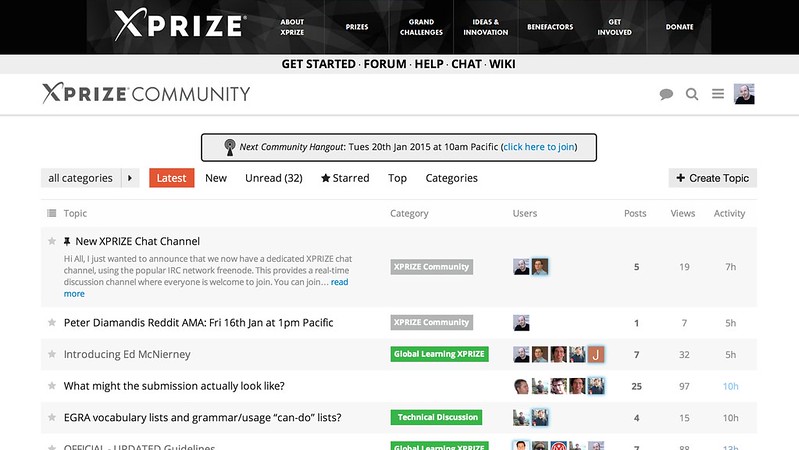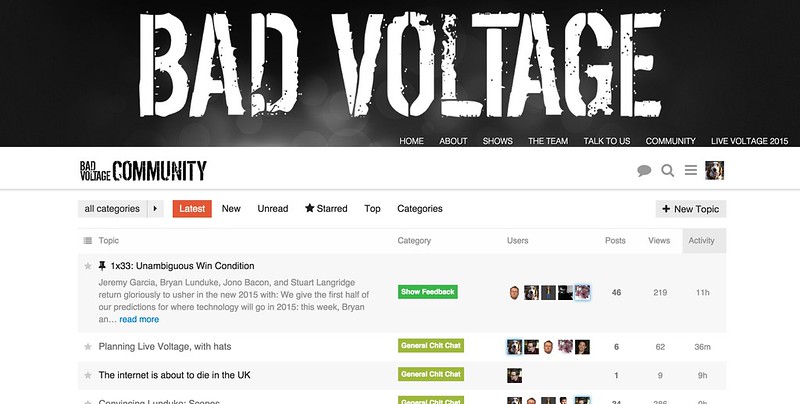Many of us are familiar with discussion forums: webpages filled with chronologically ordered messages, each with a little avatar and varying degrees of cruft surrounding the content.
Forums are a common choice for community leaders and prove to be popular, largely due to their simplicity. The largest forum in the world, Gaia Online, an Anime community, has 27 million users and over 2,200,000,000 posts. They are not alone: it is common for forums to have millions of posts and hundreds of thousands of users.
So, they are a handy tool in the armory of the community leader.
The thing is, I *don’t particularly like them*.
While they are simple to use, most forums I have seen look like 1998 vomited into your web browser. They are often ugly, slow to navigate, have suboptimal categorization, and reward users based on the number of posts as opposed to the quality of content. They are commonly targeted by spammers and as they grow in size they invariably grow in clutter and decrease in usefulness.
I have been involved with and run many forums and while some are better, most are just similar incarnations of the same dated norms of online communication.
So…yes…not a fan. 🙂
## Enter Discourse
Fortunately a new forum is on the block and it is really very good: [Discourse](https://www.discourse.org/).
Created by Jeff Atwood, co-founder of Stack Overflow and the Stack Exchange Network, Discourse takes a familiar but uprooted approach to forums. They have re-thought through everything that is normal in forums and improved online communication significantly.
If you want to see it in action, see the [XPRIZE Community](https://forum.xprize.org), [Bad Voltage Community](https://community.badvoltage.org), and [Community Leadership Forum](https://www.communityleadershipforum.com) forums that I have set up.

Discourse is *neat* for a few reasons.
Firstly, it is simple to use and read. It presents a simple list of discussions with suitable categories, as opposed to cluttered sub-forums that divide discussions. It provides a easy and effective way to highlight and pin topics and identify active discussions. Users can even hide certain categories they are not interested in.
Creating and replying to topics is a beautiful experience. The editor supports Markdown as well as GUI controls and includes a built-in preview where you can embed videos, images, tweets, quotes, code, and more. It supports multiple headings, formatting styles, and more. I find that posts really come to life with Discourse as opposed to the limited fragments of text shown on other forums.
Discourse is also clever in how it encourages good behavior. It has a range of trust levels that reward users for good and regular participation in the forum. This is gamified with badges which encourages users to progress, but more importantly from a community leadership perspective, it provides a simple at-a-glance view of who the rock stars in the forum are. This provides a list of people I can now encourage and engage to be leaders. Now, before you get *too* excited, this is based on forum usage, not content, but I find the higher trust level people are generally better contributors anyway.

Discourse also makes identity pleasant. Users can configure their profiles in a similar way to Twitter with multiple types of imagery and details about who they are. Likewise, referencing other users is simple by pressing `@` and then their username. This makes replies easier to spot in the notifications indicator and therefore keeps the discussion flowing.
Administrating and running the site is also simple. User and content management is a breeze, configuring the look and feel of most aspects of the forum is simple, and Discourse supports multiple login providers.
What’s more, you can install Discourse easily with docker and there are many hosting providers. While Jeff Atwood’s company has [their own commercial service](https://payments.discourse.org/buy/) I ended up using [DiscourseHosting](https://discoursehosting.com/) who are *excellent* and pretty cheap.
To top things off, the Discourse community are responsive, polite, and incredibly enthusiastic about their work. Everything is Open Source and everything works like clockwork. I have never, not once, seen a bug impact a stable release.
All in all Discourse makes online discussions in a browser *just better*. It is better than previous forums I have used in pretty much every conceivable way. If you are running a community, I strongly suggest you check Discourse out; there simply is no competition.








